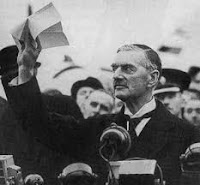Just The Facts, Ma’am by Jan Edwards
I
am very much aware of the fact that I can be a bit of a cracked record when it comes
to research, constantly banging on about how important it is to check even the
smallest details before using them in any sort of writing.
It
is something that I maintain is hugely important, but when I came against a phenomenon of commonly held
perceptions and whether being correct in the face of general opinion will
alienate a reader, I had to wonder if veracity is always seen in that light
through a readers’ perception.
A
few weeks ago I read a small section from the first draft of Bunch Courtney bk 2.
This latest crime novel is firmly anchored in the first weeks of May 1940. Dunkirk, the Blitz and Battle of Britain are
yet to come, yet May remains a pivotal month during the conflict as a whole,
not least because it saw a momentous change in our Government.
As
I saw it, in order to place a peg in time, quoting a newspaper headline in
which the Prime Minister, Mr Chamberlain faced a vote of no confidence, dated
events quite precisely.
‘Oh,
but you are wrong,’ several of the group cried. ‘Churchill was Prime Minister
throughout the war years.’
‘Not
so,’ I replied, lacing up the hood of my imaginary researchers’ anorak firmly
beneath my chin. ‘Chamberlain resigned and was replaced by Churchill on 10th
May 1940.’
It
was argued that stating Chamberlain as PM at that point might raise questions
in the minds of some readers for the above mentioned reasons, and that the
distraction of Googling the facts could risk my losing their interest.
It
made me think. Should I fudge the facts merely to avoid confusion?
One
of Churchill’s first moves in his first month as PM was the mandatory internment of
“all potential enemy aliens”, a move that Chamberlain had done all he could to
delay because he feared a backlash against innocent people fleeing Hitler and
the war. These, I felt, where the event-led issues against which my book are
set and thus wholly pertinent to my plot.
Others in the group agreed with me
and declared that facts were facts, and it was a given that all writers should use
them correctly, especially when they fly directly in the face of misconception.
As I had been reading from a first
draft I let the matter pass. The text will be rewritten several times, because
that is how I work, and as I had clearly failed to get the point across in this
early version it obviously requires some stern revision.
The second point of research
raised, however, was a correction too far.
My protagonists had decided to go ‘up to London’ to shop for some
urgently needed clothes. Once again the banner of verisimilitude was raised.
This time over that old wartime chestnut; rationing.
‘Ah, ‘I was told. ‘This would not happen because these women
would need sufficient clothing coupons to spare for somebody who did not live
in that household and that would be very unlikely.’
‘Not so,’ say I. ‘Clothing coupons were not
issued until June 1941- a whole year later.’
I do realise how many people fall into the
trap of believing that all things were rationed from the outset (including many
items that were never rationed at all). And I can quite see how a casual
mention on such a point might raise questions.
But... In my humble opinion it behoves all
writers of historical fiction to be as accurate as we are able.
The Chamberlain point can be rephrased easily
enough, but shopping is never to be taken lightly whatever the era – and facts
are facts!
In her Reith Lectures earlier this year the
historian Dame Hilary Mantel raise a similar point, saying something along the
lines of; “Our image of a squalid, filthy,
disease-ridden past isn’t entirely accurate. Life was precarious, childbirth
was dangerous and epidemics did kill, but people wore freshly washed linen,
observed complex table manners, associated dirt with disease and managed to
retain most of their teeth. In the pre-industrial era, the air even smelled
sweeter and sounded quieter.” Mantel says, “When we imagine a lost world, we
must first rearrange our senses – listen and look, before judging.”
It is comforting to know that I am not alone
in wanting to address inaccurate perceptions of our past, and whilst I may not
have Dame Hilary's clout, this should not detract from the points we have to make.
Or alternatively, when it comes to research
for my crime fiction, what better than to paraphrase one the of the mis-quoted
lines attributed to a fictional crime-buster of yesteryear...
‘Just the facts, Ma’am.’
***
Jan Edwards can be found on:
Blog: https://janedwardsblog.wordpress.com/
Blog: https://janedwardsblog.wordpress.com/
Facebook: jan.coleborn.edwards
Twitter: @jancoledwards
Titles in print – all available in print and dig formats:




Comments